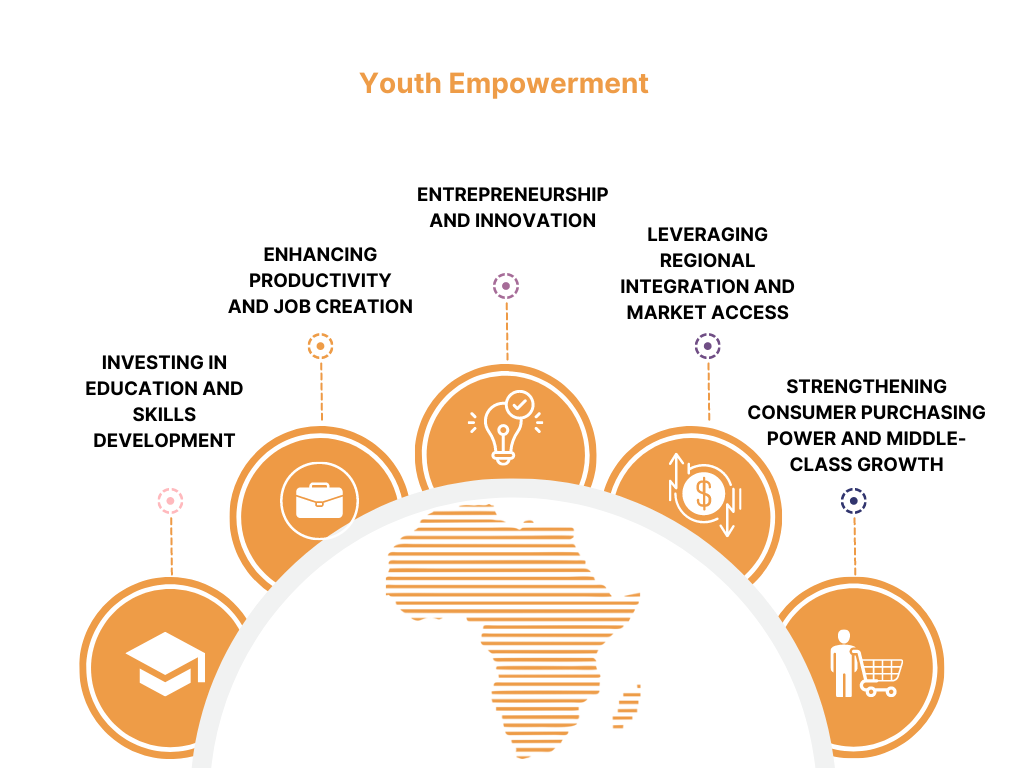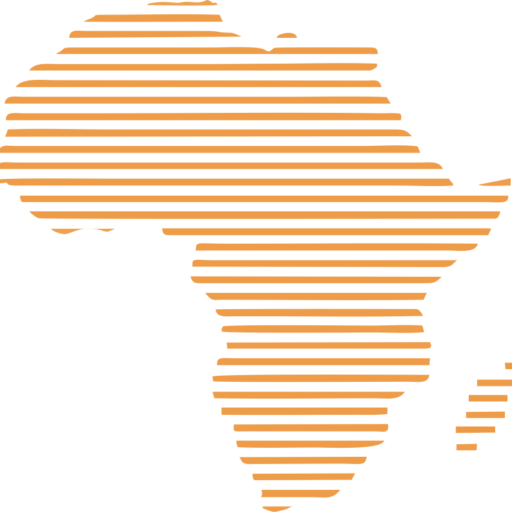
Africa is a continent brimming with potential, and its most valuable asset is its young population. Africa is the continent with the youngest population worldwide. As of 2022, around 40 percent of the population was aged 15 years and younger, compared to a global average of 25 percent.. Africa has a unique opportunity to harness the energy and talent of its youth to drive economic growth, innovation, and social development.
However, to fully realize this potential, it is crucial to empower young people, involve them in decision-making processes, and provide them with the necessary opportunities for work and innovation.
In today’s Africa, young Africans are making impactful contributions to the economy across various sectors, both locally and on the international stage. Through innovative initiatives, entrepreneurial ventures, music, sports, art, and culture, they are paving the way for a dynamic and prosperous Africa.
This article explores the importance of youth empowerment in Africa’s economic growth and outlines strategies for unleashing the continent’s economic potential.
The Youth Advantage: Africa’s Demographic Dividend
Africa’s youthful population is a demographic dividend that can propel the continent’s economic growth. With a projected population of nearly 2.5 billion people by 2050, Africa has a vast workforce and consumer base that can drive various sectors and contribute to global development. The continent’s rich natural resources, including minerals, arable land, and renewable energy sources, offer opportunities for sustainable development, industrialization, and value addition. Africa’s transition from agriculture and resource extraction to service-oriented sectors presents avenues for higher productivity, job creation, and sustainable growth.
Challenges Faced by African Youth
Despite the immense potential, African youth face numerous challenges in realizing their economic potential. Underemployment and lack of opportunities hinder their ability to contribute fully to the continent’s development. Additionally, the digital divide poses a significant barrier, with limited access to the internet and information about available opportunities. To unlock Africa’s economic potential, these challenges need to be addressed effectively. Some of these challenges are discussed in more detail below;
- Education Disparities
One of the most significant challenges that African youth encounter is unequal access to quality education. Across the continent, disparities in educational infrastructure, teacher shortages, and limited resources impede young minds from receiving a holistic and well-rounded education. Additionally, the lack of educational opportunities for girls in certain regions perpetuates gender inequalities.
Addressing this challenge requires increased investment in educational infrastructure, teacher training, and curriculum development. Governments and international organizations must collaborate to enhance access to quality education for all African youth, fostering a skilled and knowledgeable workforce for the future.
- High Youth Unemployment
Youth unemployment is a pressing concern across Africa, where approximately 60% of the population is under 25 years old. The lack of job opportunities and formal training programs leaves many young Africans jobless or working in the informal sector, leading to low wages and precarious working conditions.
To tackle this issue, governments and private sectors should collaborate to create more job opportunities, particularly in sectors with high growth potential, such as technology, agriculture, and renewable energy. Additionally, entrepreneurship programs and vocational training can equip young Africans with the skills needed to start their own businesses and contribute to economic growth.
- Digital Divide
Although technology holds the key to unlocking immense opportunities for youth empowerment, the digital divide remains a significant challenge. Many rural areas lack access to reliable internet connectivity and digital devices, restricting access to online education, job opportunities, and information.
Governments, NGOs, and private sector players should work together to expand internet infrastructure to underserved areas and make digital devices more affordable. Digital literacy training programs can also empower African youth to harness the power of technology and bridge the digital divide.
- Political Engagement and Participation
Engaging and encouraging the youth to participate in politics is critical for Africa’s sustainable development. However, many young Africans perceive politics as inaccessible and tainted by corruption, discouraging their active involvement in shaping their countries’ futures.
To address this challenge, governments must create an enabling environment for youth political participation. This can involve implementing policies that promote youth inclusion in decision-making processes, lowering the minimum age for political candidacy, and investing in civic education programs.
- Health and Well-being
The health and well-being of African youth are compromised by various factors, including inadequate healthcare facilities, limited access to sexual and reproductive health services, and the prevalence of infectious diseases like HIV/AIDS and malaria.
Comprehensive healthcare programs that focus on preventive measures, awareness campaigns, and accessible healthcare facilities are essential to improve the overall health of African youth. Empowering young people with information and services related to sexual and reproductive health is vital for their well-being and empowerment.
Youth Empowerment: Inclusion and Decision-Making

Involving young people in decision-making processes is vital for economic growth, innovation, peace, and security. Empowering young people to participate in politics and society goes beyond mere inclusion; it is a strategic imperative.
By giving young people a seat at the table, their voices can shape policies and initiatives that address their unique needs and aspirations. Recognizing young people as equal partners and right holders is essential for sustainable development. Governments and organizations must create spaces for youth participation and actively empower them to use their collective power for positive change. Some of the key areas of focus for unleashing the potential of the African youth include:
Investing in Education and Skills Development
Investing in education and skills development is crucial for equipping African youth with the tools they need to succeed in an increasingly digital world. By providing quality education, vocational training, and access to digital skills, young people can gain the knowledge and competencies necessary to thrive in the job market.
Governments, private sector entities, and development partners must collaborate to invest strategically in formal, non-formal, and informal Technical and Vocational Education and Training (TVET) sectors. Mobile-friendly digital platforms offer an attractive option to train a critical mass of youth in digital skills, given the ubiquity of mobile phones in Africa.
Enhancing Productivity and Job Creation
Improving productivity across sectors is key to generating the jobs needed to sustain Africa’s rapidly growing population. Enhancing productivity levels, particularly in manufacturing and services, can unlock economic growth and provide employment opportunities for young people. Governments should prioritize investments in infrastructure, including transportation networks, digital connectivity, and energy systems, to foster regional integration, enhance market access, and drive economic diversification. By promoting connectivity and development beyond primary cities, Africa can unlock its full growth potential.
Entrepreneurship and Innovation
Entrepreneurship and innovation are vital drivers of economic growth and job creation. Africa’s young people possess entrepreneurial spirit and innovative thinking, which can be harnessed to build vibrant startup ecosystems and drive economic transformation. Governments and organizations should create an enabling environment for youth-led entrepreneurship by providing access to finance, reducing regulatory complexities, and promoting market integration.
Supporting initiatives like the Harambee Youth Employment Accelerator in South Africa, Najja7ni in Tunisia, and the African Development Bank’s Coding for Employment program can foster entrepreneurial skills and create pathways to success for young African entrepreneurs.
Leveraging Regional Integration and Market Access
Regional integration plays a crucial role in unlocking Africa’s economic potential. By investing in regional infrastructure projects, such as transportation networks and energy systems, Africa can enhance connectivity, promote trade, and create new market opportunities.
Regional integration initiatives like the African Continental Free Trade Area (AfCFTA) have the potential to unleash the continent’s economic power by creating a single market of over 1.3 billion people. By leveraging regional integration and improving market access, African youth can tap into a larger consumer base and expand their business ventures.
Strengthening Consumer Purchasing Power and Middle-Class Growth
Africa’s growing population offers significant potential for consumer spending. However, realizing this potential requires strengthening consumer purchasing power and fostering the growth of the middle class. Governments and organizations should prioritize policies and initiatives that promote inclusive economic growth, reduce income inequalities, and provide social protection measures. By investing in education, healthcare, and social welfare programs, Africa can create a thriving middle class that can drive domestic consumption and stimulate economic growth.

Opportunities for Investors: Investing in Growth, Innovation and Potential
As the African youth continue to drive innovation, creativity, and entrepreneurship, the continent emerges as a vibrant hub for investment and growth. By recognizing the power of the African youth population and engaging in meaningful partnerships, investors and global organizations can participate in Africa’s transformative journey towards a prosperous and dynamic future. Some of the sectors that present opportunities in this regard include;
- Fintech and Digital Finance: With the rise of mobile and digital technology, fintech solutions are transforming financial services in Africa. Investors can explore partnerships with innovative startups in the fintech space, facilitating financial inclusion and providing banking services to the unbanked and underbanked populations.
- Agriculture and Agribusiness: Agriculture remains a vital sector in Africa, and by investing in agribusiness ventures, investors can support sustainable farming practices, enhance food security, and boost agricultural productivity. Agri-tech startups offer innovative solutions that address supply chain inefficiencies and connect farmers to markets.
- Renewable Energy and Clean Technology: Africa’s abundant renewable energy resources offer great potential for investment in clean energy projects. Solar, wind, and hydro-power initiatives can power communities, drive economic growth, and promote sustainability.
- E-Commerce and Consumer Tech: As more Africans gain access to the internet, e-commerce and consumer tech sectors are experiencing rapid growth. Investors can capitalize on the burgeoning middle class and rising consumer spending by supporting e-commerce platforms and consumer-focused startups.
Conclusion
Unleashing Africa’s economic potential requires the full empowerment of its young population.
By involving young people in decision-making processes, investing in education and skills development, enhancing productivity, fostering entrepreneurship and innovation, leveraging regional integration, and strengthening consumer purchasing power, Africa can create a prosperous and inclusive future.
In harnessing the tremendous potential of Africa’s young population, investors and global organizations have a unique opportunity to unlock untapped markets and seize growth opportunities across the continent. African youth empowerment, with its focus on entrepreneurship, tech innovation, social impact, and creative expression, offers a fertile ground for transformative partnerships and collaborations
The continent’s youth hold the key to shaping Africa’s destiny and driving its economic growth. By recognizing their potential and providing them with the necessary opportunities, Africa can unlock its full potential and contribute to global development. Let us embrace this vision of youth-powered growth and create a future of shared opportunities and mutual progress.
